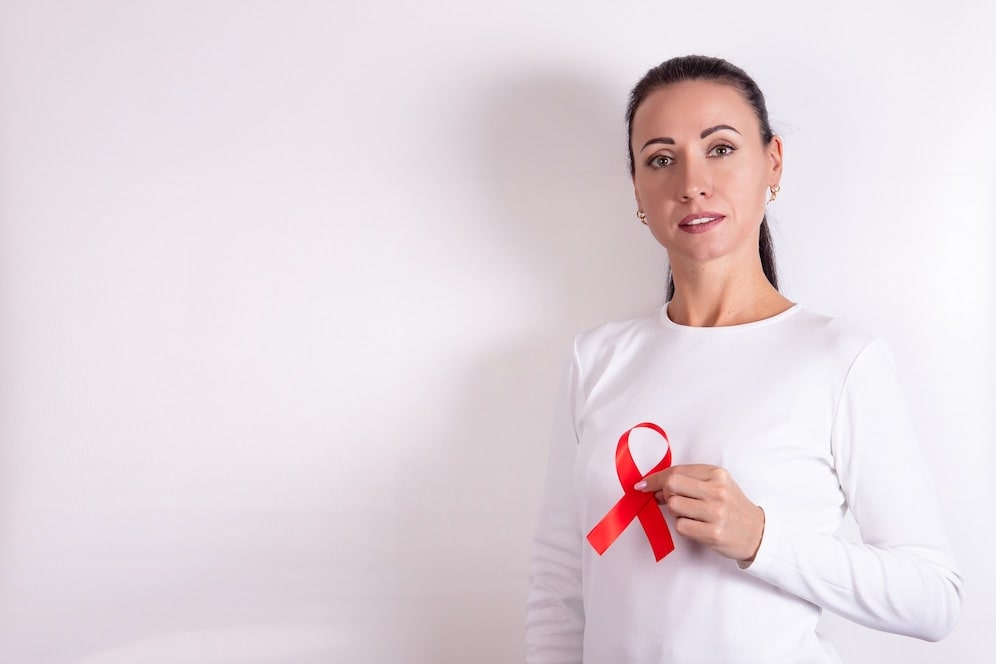Last updated on May 3rd, 2025 at 06:06 pm
Contents
- HIV in women
- Stages of HIV in women
- What are the exclusive signs and symptoms of HIV/AIDS in women?
- HIV treatment in women
- FAQs related to HIV in Female

HIV in women
Human immunodeficiency virus (HIV) is a virus that attacks your immune system. It is transmitted through sexual contact or body fluids, such as blood. HIV symptoms in women and men are mostly comparable. However, due to biological differences, women may experience some symptoms specific to them. In addition to flu-like symptoms and changes in the skin, signs and symptoms of HIV in women include irregular menstruation and more frequent vaginal infections. Let’s find out more about signs of HIV in women.
Stages of HIV in women
The stages of HIV are the same in men and women and are as follows.
1. Acute Stage:
This stage begins two to four weeks after you become infected with HIV. This stage is extremely contagious, implying that the risk of infection through sexual contact or exchange of body fluids (like blood) is the highest at this stage. In this stage, the symptoms are too subtle to be noticed. Due to the flu-like symptoms, you might think you have a cold. Other HIV symptoms in women include mouth ulcers, sore throat, body aches, night sweats, occasional fever, headache etc.
2. Chronic stage:
Although you don’t have any signs of HIV, the virus is still present in your body. You might occasionally experience symptoms like a high-grade fever, loss of weight, diarrhoea, etc. This stage continues for years.
3. Acquired immunodeficiency syndrome (AIDS):
In this stage, the body’s immune system has been severely compromised, making this the most severe of all.
Symptoms of AIDS in women include severe opportunistic infections like tuberculosis, pneumonia, skin infections, and yeast infections; menstrual changes from light flow to very heavy flow, or no blood flow at all; and cancers like cervical cancer, Kaposi sarcoma, and non-Hodgkin’s lymphoma.
What are the exclusive signs and symptoms of HIV/AIDS in women?
There are various HIV symptoms in women that differ from those in men owing to biological differences. These can range from mild to severe and vary depending on the stage of infection. Some of the common HIV symptoms in women include:
1. Changes in the menstrual cycle: lighter or heavier flow depending upon the stage of the disease.
2. Sexually transmitted infections: Human papillomavirus (HPV) infections, sores on the vulva and vagina and frequent yeast infections.
3. Pelvic inflammatory disease: PID, an infection of the uterus, fallopian tubes, and ovaries, that causes pain during penetrative sex and urinating. This is also accompanied by irregular bleeding and increased vaginal discharge.
Early Signs of HIV Infection: What You Need to Know and Do
HIV treatment in women
Antiretroviral medications (ARTs) are used in combination therapy for HIV in women to lower virus levels in the blood and stop further immune system damage. The purpose is to suppress the virus to extremely low levels to improve HIV symptoms in women and their overall health and significantly lower the risk of transmission to others. However, since some ARVs can be harmful to a developing foetus or infant, women who are pregnant, planning a pregnancy, or who are nursing are given special consideration. Parallely, female HIV patients co-infected with other sexually transmitted infections (STIs), such as hepatitis C or syphilis, may also require testing and treatment.
Conclusion
HIV is a serious illness with no cure. However, HIV symptoms in women can be effectively managed with early detection and prompt treatment. It also helps to prolong your life and improve your quality of life. Therefore, it is important to be aware of the signs of HIV in women, which can differ from those in men. If you have symptoms, consult your doctor, get tested and get started on ART, as early diagnosis and treatment are critical in preventing serious health complications. Take preventive measures if you or your partner have a high risk of exposure. Use condoms during sex, avoid multiple sexual partners, avoid sharing needles, and get tested for HIV regularly. You can also take medications to prevent yourself from getting HIV if you are exposed to the virus, of ocurse, after you consult your doctor. Talk to your doctor to know more.
For all your medical supplies, visit Medkart pharmacy, India’s most trusted medicine store.
FAQs related to HIV in Female
1. What are the symptoms of HIV in women?
The early signs of HIV in women can vary, and some women may not experience any symptoms. However, as the disease progresses, HIV symptoms in women include menstrual changes, vaginal infections, PID, and cervical cancer.
2. Can women transmit HIV to their unborn babies during pregnancy?
Yes, HIV-positive women can pass the virus to their unborn children during pregnancy, childbirth, or breastfeeding. This is known as mother-to-child transmission (MTCT). However, the risk of mother-to-child HIV transmission can be significantly decreased with the right medical care and treatment. To lower the risk of MTCT, antiretroviral therapy (ART), which involves taking a combination of HIV medications, is advised for all pregnant women living with HIV.
3. How can I prevent myself from getting HIV?
There are several ways you can protect yourself from getting HIV. Use condoms during sex, avoid sharing needles, and get tested for HIV regularly if you are at risk. You can also take medications to prevent yourself from getting HIV if you are exposed to the virus. Talk to your doctor to know more.
